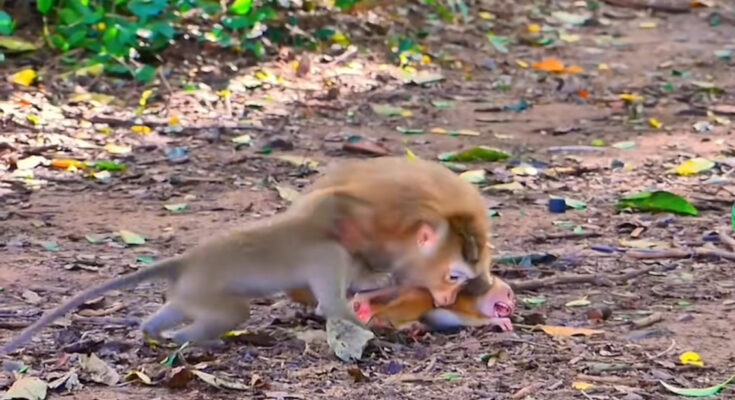A Baby Monkey Almost Died After Being Brutally Attacked by a Large, Aggressive Monkey: A Shocking Glimpse Into Primate Social Struggles
In a shocking and heartbreaking incident caught on camera in a forest reserve in Southeast Asia, a baby monkey came close to losing its life after being savagely attacked by a much larger, aggressive adult monkey. The scene, which unfolded rapidly in front of stunned onlookers and wildlife photographers, has sparked a discussion among primate experts and animal lovers about the complex social dynamics, territorial instincts, and aggression within monkey troops.
A Savage Encounter in the Wild
The attack occurred in a well-known monkey habitat where multiple troops of macaques coexist but often clash over territory, food, and dominance. According to eyewitnesses, the infant monkey, believed to be just a few weeks old, was playfully exploring under the watchful eyes of its mother when a male from a rival troop suddenly lunged at it without warning.
The adult male, significantly larger and visibly agitated, seized the baby by its limbs and began violently shaking and biting it. The mother screamed and tried to intervene, but she was quickly overpowered by the aggressive male. Other monkeys in the area fled or watched helplessly, unwilling to get involved in the dangerous confrontation.
Intervention and a Narrow Escape
Fortunately, human presence may have helped prevent a tragedy. Local wildlife officers, monitoring the area for poaching activity, were alerted by the commotion and rushed to the scene. Loud noises and movement from the humans startled the attacker, who dropped the baby and retreated into the trees.
The infant monkey was immediately retrieved and rushed to a nearby animal rescue center. Vets found several bite wounds, bruises, and signs of trauma, but miraculously, no life-threatening injuries. After receiving treatment and care, the baby is now recovering, though it remains physically and emotionally scarred by the ordeal.
Understanding Monkey Aggression
While the attack appears brutal to human observers, primatologists explain that such behavior is not uncommon in the wild. In many monkey species, infanticide and aggression are part of the complex social strategies used by dominant males to control reproduction, eliminate rivals’ offspring, or assert dominance.
“This kind of aggression is deeply rooted in competition and survival,” explains Dr. Mira Jatwani, a primate behavior specialist. “It’s harsh, but within the context of their social hierarchy, it serves a purpose. However, increasing human interference, habitat loss, and food scarcity are making these incidents more frequent and more violent.”
A Call for Awareness and Conservation
This disturbing event highlights the urgent need for better conservation strategies that protect wildlife from both internal and external threats. Habitat fragmentation and human encroachment are intensifying conflicts not only between humans and animals but also within animal communities themselves.
As the rescued baby monkey begins a long road to recovery, wildlife experts urge the public to support conservation efforts and respect the delicate balance of life in the wild. Nature is not always kind — but with greater understanding and compassion, humans can play a role in preserving the fragile lives of those who call it home.



